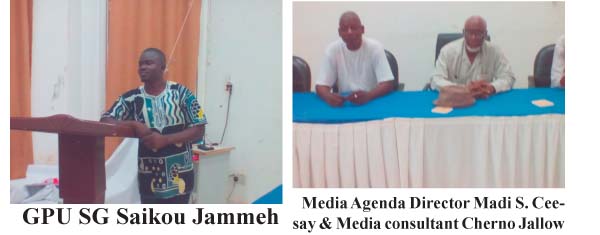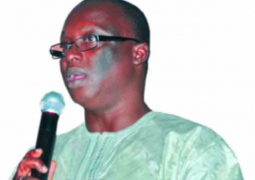
(Thursday August 25th, 2016 Issue)
Saikou
Jammeh, Secretary General of the Gambia Press Union (GPU), has said that since
journalists are dealing with the public, they have to deliver good messages and
work together based on our traditions, constitution and culture.
He
said that in previous elections they have witnessed voter apathy or a low turnout,
adding that voting is a civic right and the failure of the voter is the failure
of the media.
The
GPU secretary general was speaking at a two-day orientation workshop for
commercial radio stations on the use of voter education messages, organised by
Media Agenda and held at the Tango conference hall.
The
training workshop, held on 24 and 25, was funded by the US Embassy in Banjul.
He
said a lot of mistakes had been done by the media in the past caused by lack of
sensitisation.
“The
newspapers have very limited capacity to sensitize the public because we have
four major newspapers in the country and more than 20 community radios, but
half of the population is not literate, but all of them have access to
community radios,” he told the journalists.
He
said most of the public do not have access to newspapers because they do not
buy newspapers and news is normally read on radios in English and local
languages, hence “if you want to target the masses you target the radio.”
Cherno Jallow, a media consultant and veteran
journalist, also speaking on the occasion, said the role of the media is to
inform, educate and entertain.
He
said educating voters is not new; they have been doing this for years and the
electorate are the contested ground and the sovereign will of the Gambian
people.
Mr
Jallow explained that during elections voter turnout is usually minimal, adding
that voting is a civic right for every Gambian citizen.
“Your
role is to convince the voters to vote and it is the will of the Gambian people
to be an obedient servant,” he said.
He
said during elections, the politicians come around to convince the public to
vote for them, and by voting you exercise the sovereign will.
“The
media is responsible for higher voter turnout in your messages you disseminate,
and you have improved your communication skills to be able to convince the
public why the voters have to vote,” Mr Jallow said.
The
coordinator of Media Agenda, Madi Ceesay, in his remarks, said there has been a
strong partnership between Media Agenda and the network of community radios.
The
radio stations translate the message at local levels and the broadcast
journalists transmit the message to the general public; that is why they are
key in the training workshop, he added.


